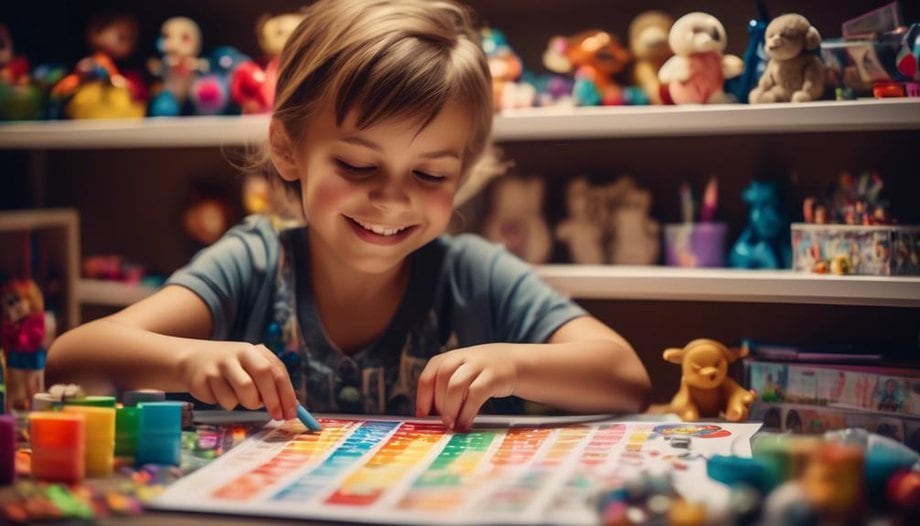What to Do to Reinforce a Child's Positive Behavior Daily

To reinforce a child's positive behavior daily, there are several strategies that can be effective. One important approach is to actively engage with the child. This means spending quality time with them and participating in activities that they enjoy. By doing so, you can show the child that you value their interests and that you genuinely care about their well-being.
Another key aspect is showing genuine interest in the child's activities. This can involve asking them questions about what they are doing, listening attentively to their responses, and providing positive feedback and encouragement. When a child feels that their activities are valued and appreciated, they are more likely to continue engaging in positive behaviors.
Creating an environment that nurtures a child's growth and encourages them to thrive is also crucial. This can include setting clear expectations and boundaries, providing consistent and fair discipline, and offering praise and rewards for positive behavior. Additionally, it is important to provide opportunities for the child to learn and grow, both academically and socially. This can be done through engaging educational activities, extracurricular opportunities, and exposure to diverse experiences.
By incorporating these strategies into daily interactions with a child, you can reinforce their positive behavior and help them develop into confident and well-rounded individuals.
Set Clear Expectations and Boundaries
To reinforce your child's positive behavior daily, it's essential to set clear expectations and boundaries. Setting boundaries provides structure and guidance, helping your child understand what's acceptable and what's not. When children know the limits, they feel secure, knowing that their actions have consequences. It's crucial to communicate these expectations clearly and consistently, so there's no confusion.
Consistent discipline goes hand in hand with setting boundaries. When your child crosses a boundary, it's vital to respond with appropriate consequences. By consistently enforcing these consequences, you teach your child about responsibility and accountability. They learn that their actions have direct outcomes, reinforcing positive behavior while discouraging negative ones.
When setting expectations and boundaries, it's important to be firm but also compassionate. Remember, your goal is to guide and teach, not to control. By setting clear expectations and boundaries, you create a safe and nurturing environment for your child to grow and thrive. You empower them to make better choices and develop self-discipline.
Use Positive Reinforcement and Rewards
As you continue to guide and teach your child, one powerful tool to reinforce their positive behavior daily is by using positive reinforcement and rewards. Positive reinforcement is a strategy that focuses on praising and acknowledging your child when they exhibit desirable behaviors. It helps to strengthen those behaviors and encourages your child to continue behaving in a positive way.
Here are three ways you can effectively use positive reinforcement and rewards in your daily interactions with your child:
- Offer specific praise: When your child displays a positive behavior, be specific in your praise. Instead of saying, 'Good job,' say something like, 'I really appreciate how you shared your toys with your sister. That was very thoughtful of you.' By being specific, you're showing your child exactly what behavior you value and reinforcing it.
- Use rewards strategically: Rewards can be a powerful incentive for children. Consider using a reward system where your child earns points or tokens for exhibiting positive behaviors. These can then be exchanged for privileges, treats, or special activities. Make sure the rewards are meaningful to your child and reflect their interests and preferences.
- Celebrate achievements: Whenever your child achieves a milestone or accomplishes a goal, take the time to celebrate their success. This reinforces the positive behavior and motivates them to continue striving for excellence. Whether it's a small victory or a major accomplishment, acknowledge and celebrate their efforts.
Provide Consistent Praise and Encouragement
Consistently praising and encouraging your child's positive behavior is a powerful way to nurture their growth and self-confidence. When you provide consistent reinforcement and praise, you're building confidence in your child, showing them that their efforts are recognized and valued. Your words of encouragement can be like a beacon of light, guiding them on their journey towards success.
Children thrive on positive attention and validation. When you consistently praise and encourage them, you're providing them with the motivation and support they need to continue making positive choices. Your words have the power to shape their self-image and belief in their abilities. By acknowledging their achievements, big or small, you're fostering a sense of accomplishment and pride within them.
Remember to be specific in your praise. Instead of saying, 'Good job,' try saying, 'I am so proud of how you handled that situation with kindness and empathy.' This kind of feedback helps them understand exactly what behavior you're praising and encourages them to continue exhibiting it.
Consistent praise and encouragement not only reinforce positive behavior but also strengthen the bond between you and your child. When they feel seen, heard, and appreciated, they're more likely to trust and confide in you. Your words of encouragement become a source of comfort and motivation for them.
Establish a Daily Routine and Structure
Establishing a daily routine and structure is the foundation upon which your child's positive behavior can thrive. By creating a structured environment, you provide your child with a sense of stability and predictability, which are essential for their overall development and well-being.
Here are three key reasons why establishing routines and creating structure is so important:
- Promotes a sense of security: When children know what to expect on a daily basis, they feel secure and confident. Having a consistent routine helps them feel safe and reduces anxiety, allowing them to focus on their tasks and responsibilities.
- Develops self-discipline: Routines teach children the importance of self-discipline and responsibility. By following a set schedule, they learn to manage their time effectively, prioritize tasks, and develop good habits. These skills will benefit them not only in childhood but also in their adult lives.
- Enhances cognitive and emotional development: Regular routines provide opportunities for children to learn and grow. They allow for structured learning experiences, such as homework time or reading before bed. Additionally, consistent routines help children regulate their emotions and develop important life skills, such as problem-solving and decision-making.
Use Effective Communication and Active Listening
You have the power to strengthen your child's positive behavior through effective communication and active listening.
By setting clear expectations, you create a foundation for open dialogue where your child feels comfortable expressing themselves.
Take the time to validate their feelings and thoughts, showing them that their voice matters.
Through these simple yet powerful actions, you can build a strong connection with your child and foster their growth and development.
Clear Expectations Set
Using effective communication and active listening, you can create clear expectations that reinforce positive behavior in your child on a daily basis. Setting boundaries and providing consistent reinforcement are essential in helping your child understand what's expected of them.
Here are three ways you can set clear expectations:
- Communicate openly: Take the time to talk to your child about your expectations, using clear and concise language. Make sure they understand what's acceptable and what's not.
- Be consistent: Consistency is key when setting expectations. Stick to the rules you have established and follow through with consequences when necessary. This will help your child understand the importance of their behavior.
- Listen actively: Give your child the opportunity to express their thoughts and feelings. Actively listen to them without judgment, and consider their perspective when reinforcing positive behavior.
Encourage Open Dialogue
Building on the foundation of clear expectations, fostering open dialogue through effective communication and active listening is a powerful way to reinforce positive behavior in your child on a daily basis.
It's through open communication that trust is built and strengthened, creating a safe and nurturing environment for your child to express themselves freely. By actively listening to your child, you aren't only showing them that their thoughts and feelings are valued, but you're also gaining valuable insight into their world.
This open dialogue allows you to understand their needs, fears, and dreams, enabling you to provide the guidance and support they require. When you encourage your child to speak openly and honestly, you're fostering a strong bond built on trust, which in turn helps to reinforce their positive behavior and overall well-being.
Validating Feelings and Thoughts
By actively listening and validating your child's feelings and thoughts, you create a powerful connection that strengthens their sense of self-worth and reinforces their positive behavior. Here are three ways to effectively validate your child's emotions and promote their emotional well-being:
- Show empathy: Put yourself in your child's shoes and try to understand their perspective. Validate their emotions by acknowledging their feelings and letting them know that it's okay to feel the way they do.
- Be present: Give your child your undivided attention when they express their thoughts and feelings. Maintain eye contact and actively listen without interrupting or judging. This shows your child that their feelings and thoughts are important to you.
- Reflect and validate: Repeat back what your child has shared with you to ensure understanding. Validate their feelings by acknowledging and accepting them. Let them know that their emotions are valid and that you're there to support them.
Model Positive Behavior and Attitudes
To foster a positive environment for your child, embodying positive behavior and attitudes is crucial. As a parent, you're the most influential role model in your child's life. They observe your every move and absorb your actions and attitudes like a sponge. It's therefore essential that you consistently demonstrate positive behavior and attitudes.
Start by practicing gratitude and appreciation. Expressing gratitude for the little things in life sets a powerful example for your child. Show them how to be thankful for what they've and to find joy in everyday moments. When faced with challenges, maintain a positive outlook and demonstrate resilience. Let your child see that setbacks are temporary and that they can overcome obstacles with a positive mindset.
Another important aspect of modeling positive behavior is showing kindness and empathy towards others. Teach your child the importance of treating others with respect and compassion. Encourage them to be inclusive, understanding, and supportive of their peers. By demonstrating empathy, you teach your child the value of kindness and help them develop strong interpersonal skills.
Encourage Problem-Solving and Decision-Making Skills
Now that you have laid the foundation of positive behavior and attitudes, it's time to empower your child with the essential skills of problem-solving and decision-making. These skills are vital for your child's growth and development, as they'll encounter various challenges and choices throughout their life. By encouraging problem-solving strategies and decision-making techniques, you're equipping your child with the tools they need to navigate the complexities of the world.
Here are three ways you can encourage your child's problem-solving and decision-making skills:
- Foster critical thinking: Encourage your child to think critically by asking open-ended questions and encouraging them to explore different perspectives. Help them analyze the situation, identify potential solutions, and evaluate the pros and cons of each option.
- Teach problem-solving steps: Break down the problem-solving process into manageable steps. Teach your child to define the problem, brainstorm possible solutions, choose the best option, implement the solution, and evaluate the outcome. By following these steps, your child will become more efficient and confident in their problem-solving abilities.
- Promote decision-making autonomy: Give your child opportunities to make decisions on their own. Start with small choices and gradually increase the complexity. Encourage them to consider the consequences of their decisions and take responsibility for the outcomes.
Foster a Supportive and Loving Environment
To foster a supportive and loving environment for your child, it's essential to encourage positive interactions and provide consistent praise.
By actively engaging with your child and promoting positive communication, you create a safe space where they feel valued and loved.
Offering genuine praise for their efforts and achievements reinforces their self-esteem and encourages them to continue exhibiting positive behavior.
Encourage Positive Interactions
Create an environment filled with love and support, nurturing positive interactions that uplift and empower your child. Encouraging positive interactions is essential for your child's overall development and well-being. Here are three ways you can promote positive interactions in your child's life:
- Encourage socialization: Provide opportunities for your child to interact with peers and develop meaningful relationships. Encourage participation in group activities, playdates, and team sports. Socialization enhances communication skills, fosters empathy, and promotes a sense of belonging.
- Promote empathy and kindness: Teach your child the importance of empathy and kindness towards others. Encourage them to understand and consider others' feelings, perspectives, and experiences. Model empathy and kindness in your own interactions and praise your child when they demonstrate these qualities.
- Create a supportive and loving environment: Create a safe and nurturing space where your child feels valued and supported. Listen actively, offer encouragement, and provide constructive feedback. Celebrate their achievements and milestones, no matter how small. A supportive and loving environment cultivates positive interactions and enables your child to thrive.
Provide Consistent Praise
Foster a supportive and loving environment by consistently praising your child's positive behavior. Providing specific feedback and acknowledging their effort can go a long way in building their self-esteem and encouraging them to continue their positive actions. Take the time to notice and appreciate the small things they do, whether it's sharing with a sibling, completing their homework on time, or showing kindness to others. By offering specific praise, such as "I'm proud of you for sharing your toys with your sister" or "Great job on finishing your homework, I can see how hard you worked," you are reinforcing their positive behavior and motivating them to continue making good choices. Remember, your words have the power to shape your child's self-perception and nurture their growth. So, be consistent in providing praise and watch them flourish in a supportive and loving environment.
| Positive Behavior | Specific Praise |
|---|---|
| Sharing with others | "I'm proud of you for sharing your toys with your sister." |
| Completing homework on time | "Great job on finishing your homework, I can see how hard you worked." |
| Showing kindness to others | "Thank you for being so kind to your friends. Your actions make a difference." |
Frequently Asked Questions
How Can I Effectively Communicate and Actively Listen to My Child?
To effectively communicate and actively listen to your child, practice effective discipline and build trust. Show genuine interest in their thoughts and feelings, and create a safe space for open and honest conversation.
What Are Some Examples of Positive Reinforcement and Rewards That I Can Use?
To reinforce your child's positive behavior, use examples and strategies that work for them. Find rewards that motivate them and create a daily routine that encourages their growth. Remember, consistency is key!
How Can I Establish a Daily Routine and Structure for My Child?
To establish a daily routine and structure for your child, start by setting clear boundaries and expectations. Create a schedule that includes regular activities and consistent rules. By providing stability and consistency, you can help your child thrive.
What Are Some Ways I Can Encourage Problem-Solving and Decision-Making Skills in My Child?
You can encourage independence and nurture problem-solving skills in your child by giving them opportunities to make decisions and solve problems on their own. This will help them develop confidence and critical thinking abilities.
How Can I Foster a Supportive and Loving Environment for My Child?
To foster a supportive and loving environment for your child, focus on fostering emotional intelligence and creating a safe space for expression. Encourage open communication, show empathy, and provide unconditional love.











